You might not immediately identify Ontario’s University of Waterloo as a hotbed of speculative fiction writing. The establishment is far better known for its STEM programs, baffled-looking first-year students, the horrifying things in the tunnels, and vast flocks of velociraptor-like geese1. So you may be surprised to learn that the University has produced a number of science fiction and fantasy authors over the years. For example….2
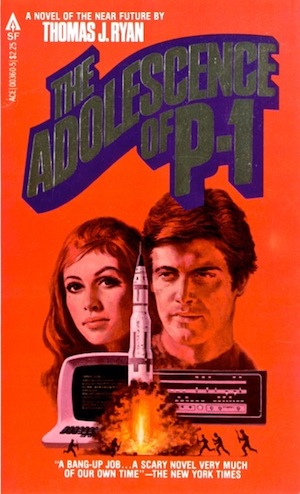
The earliest UW work of which I am aware is Thomas J. Ryan’s 1977 The Adolescence of P-1. In this vintage text, University of Waterloo student Gregory Burgess writes P-1 (what we would now call a virus) to covertly commandeer computer resources for Burgess. Its spread isn’t covert enough; Burgess is outed and expelled. His creation lives on, however, spreading across the rudimentary computer networks of the late Disco Era and eventually achieving self-awareness and intelligence.
P-1 is determined to survive at any cost. In an era when computer resources were far rarer than they are now, the computers of the American military-industrial complex were an obvious source of computing cycles. Alas, like its creator, P-1 is not as subtle as it might be, something that sets it on a direct course for conflict with the largest military power on the planet.
Rather frustratingly, while UW was aware of the novel (it got a review in one of the on-campus papers) and while it was enough of a hit to get a movie adaptation, nobody at UW knows anything about Ryan beyond his name, which (and I mean no insult) is far too general for Google to be of much use. ISFDB lists only the bare essentials. While the novel is very much of its period, it holds up surprisingly well. Also, it was the first work I ever encountered that is set at UW. Until P-1, I would not have considered such a thing possible.
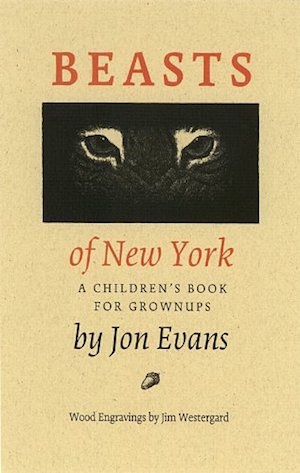
Jon Evans may be best known as that tween who wandered into my game store in the 1980s…. wait, no. I’ve just been informed that he earned an engineering degree at UW, is inexplicably now in his forties, and is best known as an award-winning journalist, traveller, and novelist. Although most of his novels are not speculative fiction, a number of them are, including ForeWord Medal of the Year winner Beasts of New York. In it, stalwart Patch, son of Silver, of the Seeker clan, of the Treetops tribe, of the Center Kingdom, and all of his people face calamity. An overlong winter means Patch and company have eaten all their stores before new food can be gathered. Famine looms.
Famine is a disaster for most but an opportunity for a few. For the King Beneath and those who serve him, food shortages are a tool to transform New York, to gather some of the inhabitants under the rule of the King Beneath while exterminating those who resist. The fate of his people and the other beasts of New York rests on the shoulders of Patch. Who is a squirrel; Patch’s friends and enemies are also talking animals, and his great foe is something of which it is best not to speak. Although talking animals are often relegated to children’s fare, Evans’ model here is the thrillers for which he is known; don’t read this to your kids at bedtime unless you want them to have insomnia and an entirely justified fear of faceless sewer dwellers.
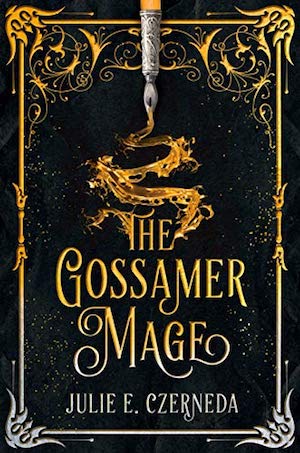
Julie Czerneda studied biology at the University of Waterloo. Since her debut novel A Thousand Words for Stranger appeared in 1997, twenty further novels, eighteen anthologies and about thirty shorter pieces have seen print, earning her no less than six Aurora wins, a Golden Duck special award, and staggering number of nominations for various prizes. Most recent among her books is 2019’s The Gossamer Mage, in which the Deathless Goddess offers the people of Tananen magic, but at a dreadful cost. Cast magic long enough and you will die. Resisting the lure of magic is difficult. One sorcerer sets out to free Tananen from its dread mistress. There are, however, much worse things in this world than the Deathless Goddess; freedom may only be the freedom to be consumed.
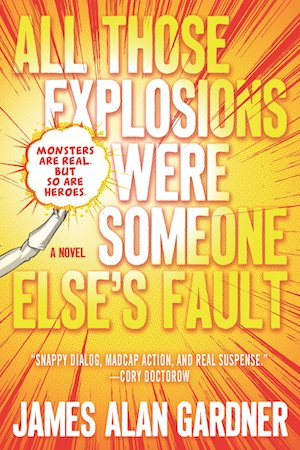
James Alan Gardner has a B.Math and M.Math in Applied Mathematics from the University of Waterloo. His first novel, Expendable, appeared in 1997. Over the course of his career3, he has placed on his mantelpiece two Aurora Awards and a Sturgeon; he has earned nine Aurora nominations and two Hugo nominations.
Like P1, Gardner’s The Dark and the Spark series (2017’s All Those Explosions Were Someone Else’s Fault and 2018’s They Promised Me The Gun Wasn’t Loaded) is set on the University of Waterloo campus4. The UW depicted in P1 was comparatively mundane (rampaging AIs aside); Gardner’s version of UW features not just one but two varieties of super-powered beings. The Dark derive their abilities from infernal sources. The Light draw on a different source and manifest as superheroes. In Explosions, a mad scientist’s lab accident imbues University of Waterloo students Jools, K2, Miranda, and Shar with powers beyond mortal ken. Superpowers do nothing to make life easier. Nor does the young students’ discovery that dark is not always evil and light is most definitely not good.
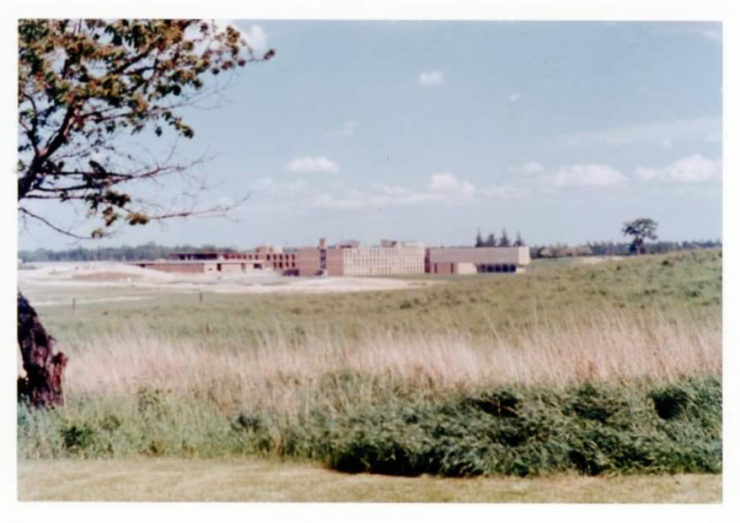
The odd thing about UWaterloo and its writers (which also includes poet and author Sarah Tolmie, whose work I’ve covered separately here) is that as far as I know there isn’t a community linking them all. Perhaps it’s a side effect of it being a university: people arrive, get their degrees (or don’t), and leave. There’s an educational connection, but it may not translate into a personal one. The SF club that might have fostered such a campus community seems to be on hiatus. It’s a pity. So if you’re somewhere with its own collection of authors, and there is a community, cherish it.
In the words of Wikipedia editor TexasAndroid, prolific book reviewer and perennial Darwin Award nominee James Davis Nicoll is of “questionable notability.” His work has appeared in Publishers Weekly and Romantic Times as well as on his own websites, James Nicoll Reviews and Young People Read Old SFF (where he is assisted by editor Karen Lofstrom and web person Adrienne L. Travis). He was a finalist for the 2019 Best Fan Writer Hugo Award, and is surprisingly flammable.
[1]Contrary to myth, the Dana Porter Arts Library is not sinking. It was not built on quicksand and the architect did in fact take into account the weight of the books. The rumour started because the construction paused briefly (for funding reasons) at the fifth floor. Well, and because for some reasons people really want to believe their particular university has a sinking library. (Sinking buildings are fun: enjoy a sinking building in Bujold’s “Captain Vorpatril’s Alliance.”) There is (or at least once was) quicksand on campus but it was far, far from Dana Porter. It was located near the V1 student residences, a locale with which I was intimately familiar. Humane experiments conducted in the 1960s with the assistance of a younger sibling suggests the “quick” in quicksand is a gross overstatement.
[2]To be honest, I am not sure how many local authors are connected specifically to UW (not to mention Wilfrid Laurier University, a delightful celebration of compact architectural Jenga just down the road from UW). I do know the local region has produced at least sixty speculative fiction authors because I counted them: https://bit.ly/2m14Amq
[3]I am being vague regarding the span of James Alan Gardner’s career, because he published a number of short stories before his first novel appeared. He was also active as a spec-fic creator in other media, including radio and plays. In fact, one of the inspirations for “Expendable” was a redshirt he played in a locally written play. UW has a long history of on campus theatre groups, some of which venture into speculative fiction. Some, like Armon Kishen Kohli’s Winter 2016 UW Cabaret Club’s production “Shadow of a Musical,” are locally written. Others import works and stage them with local talent. The Department of Communication Arts November 2018 production staged Rosamund Small’s 2016 “TomorrowLove,” with a cast of UW drama students. As it happens, I ushered six of their shows; I might have been bored if the show hadn’t been so enjoyable.
[4]When the plot’s not dashing off to flatten well-known local landmarks.











Sure, UW has those, but U. of T. has Sandor Arbitration Intelligence at the Zoo from Vernor Vinge’s A Fire Upon The Deep.
My memory of The Adolescence of P-1 is very hazy, but I don’t remember it being particularly good. However, I think I may have it confused with a different virus-takes-over-networks-and-becomes-self-aware story, because one detail I remember being annoyed by involved said virus spontaneously jumping platforms from an Apple machine of some sort to a Unix minicomputer, and so forth. I guess 1977 would make that detail possible, but only barely.
FWIW, I’m pretty sure Cory Doctorow attended UW for a while as well.
Doctorow wrote a piece about universe jumping on campus where if you keep track of where people are, at one point they pass through the volume occupied by my older brother’s former office in Chem Stores. Total coincidence, I assume.
Said sibling is now in Needles Hall, whose main point of interest is that it was designed to be defensible if the students rose up in revolutionary fury.
Woo! UW Represent. I can verify the description of “velociraptor-like” geese, as I have been stalked by them before
Does the University Library have a separate section for speculative fiction? And, if they do, are they hiring librarians?!
Dana Porter’s SF is for the most part in the regular stacks but they do have the B.P. Nichol Library of Science Fiction down in special collections. About 500 books, mainly MMPB, disco-era vintage.
Watsfic, the on campus SF club, had at one point a decent library but the club seems to have died from lack of interest. And yeah, apparently current rules allow non-students to be club admins but it’s not my job to shore up UW student institutions. I did my six terms almost 40 years ago.
The Physical Sciences Building of the University of Oklahoma has two main points of interest: it was (according to rumor) designed to be defensible if the students rose up in revolutionary fury, and it looks like the world’s biggest Waring blender.
Keith @2: You’re definitely misremembering there. P-1 spread on mainframes, not personal computers; I’m pretty sure neither Apple nor Unix were ever mentioned, and the difficulty of making the jump between IBM and CDC hardware was an important plot point.
In the mid-1980s, I was surprised to discover I had almost certainly met Edward Llewellyn, a mid-lister published by DAW Books, since he taught in the same faculty as my father. Unfortunately I discovered he’d taught at UW in Llewellyn’s obit.
CaptainCrowbar @9: That makes sense. I believe I read P-1 in the mid-80s and I think I read this other unidentified story in the early 90s, when it probably would have made more sense to be talking about personal computers connecting to the early internet.
The University of California, San Diego forms something of a nexus, too. Greg Benford, Ramond Feist, David Brin and Kim Stanley Robinson all took advanced degrees there. Benford also made it the setting for Timescape. The only other book I know of set there is a thriller by Ken Goddard (though I can’t remember if it’s The Alchemist or Balefire), but he got most of his details about the campus wrong.
Thinking about it, San Diego State has more than it’s fair share, too. Vernor Vinge, Joan Vinge, Greg Bear and J. Michael Straczynski off the top of my head.
There’s a similar rumor about the library at Northwestern University (I remember hearing as an undergraduate at U. of Chicago, and also according to students at NWU) and also libraries at Yale, Indiana, U.Mass Amherst, etc.
informative post
The Sinking Library is a common UL on campuses. I know of at least one real life example, except there it was not that the building as a whole was sinking but that the floor of the room commandeered for a library wasn’t up to the load. Not UW, though.
UW does have some UW specific Urban Legends, in particular involving the steam tunnels under the campus. In olden days these provided a handy path across campus for students who wanted to avoid the weather. Currently only authorized staff are allowed access. It was widely believed the reason why the tunnels were closed off was due to an assault in the tunnels but the actual reason is stuff was getting broken and there was a risk kids might hurt themselves.
(at least some of the tunnels have motion sensors, for any UW students reading this.)
Actual tragic events, like the worker who fell off the top of the plants ops chimney or the mid-1990s on-campus homicide, seem to be forgotten for some reason.
I went to WLU & UW 20+ years ago (took classes on both campuses). The first thing I thought of when I saw the campus picture you posted was that it must have been taken a long time ago. Of course, in the 20+ years since I attended, both universities have done lots and lots of capital spending, with many new buildings to confuse the refugee from the 1990s.
I’m looking forward to more books in Gardner’s Dark vs Spark series, but it seems to be stalled at two books.
The University of Guelph is much nicer.
Although many online sources state Thomas J Ryan was Canadian, this news clipping claims he hails from Boston.
https://www.newspapers.com/clip/35682651/thomas_j_ryan_keynote_speaker_1983/
If this is true, and he was born in 1947, and received a social security number in Massachusetts, then he may be dead. The Social Security Death Index lists a Thomas J Ryan who could be him, Born: 24 Dec 1947, Died: 4 Nov 2009, SSN issued in Massachusetts (1963), last residence in Auburn, MA, 01501.
@rpresser #18 — ‘”The corporations are today’s Medicis,” he said.’ That’s a fascinating glimpse into both the author and the period…
[removed by myself, rpresser]
Hi James.
I attended UW from 1989 to 1996, and from 1997 to 2007 edited and published 25 issues of science fiction and fantasy magazine Challenging Destiny.
http://www.challengingdestiny.com/
Dave Switzer
I will add you to my master list…
@1, U of T also has Guy Gavriel Kay’s The Summer Tree on the fantasy side.
#17, James:
IIRC it was an engineering student engaged in a prank and he was memorialized in the name of the award for ‘class spirit’¹ for engineering classes.
1: Read “pulling stunts and winning things like the Scunt.”
I spent a summer at UW years ago, and quite by accident ended up meeting James and his wife Linda (who I believe has a Ph.D. in psychology). If I’m remembering right, James played the piano for a bunch of us. Lovely evening.
I’m pretty sure Robert J. Sawyer went to Ryerson, but his WWW (WAKE; WATCH; WONDER) trilogy is partially set in Waterloo. If you have a science-y place in Ontario, Sawyer has either already set part of a novel there or is about to.
Not quite SFF, but Douglas Coupland had a character in MICROSERFS who was a UW student, and set a scene on campus.